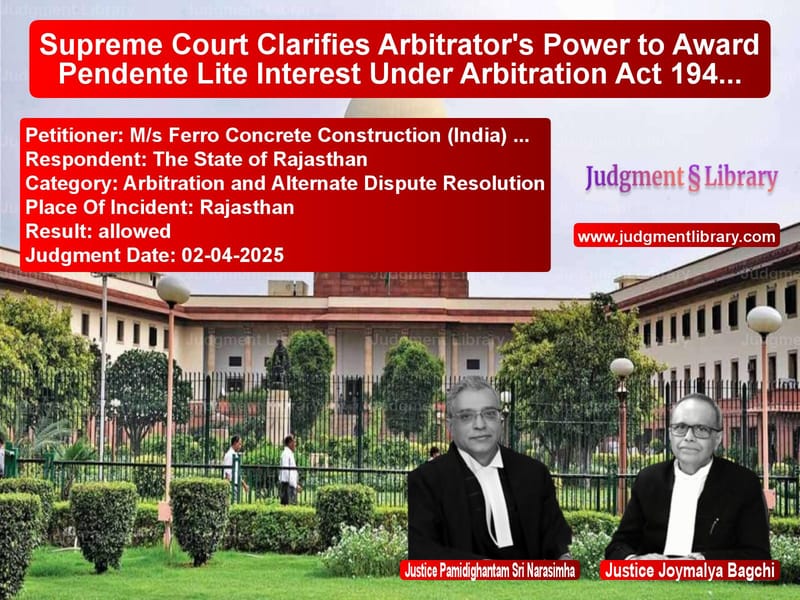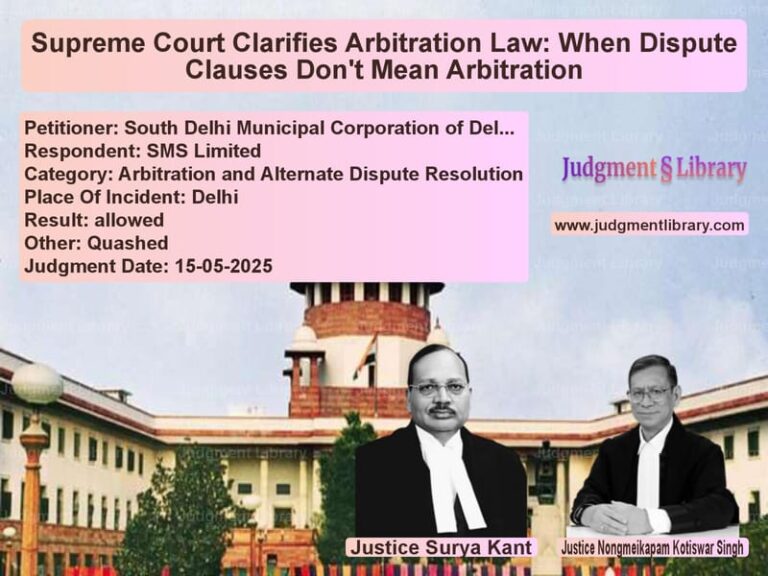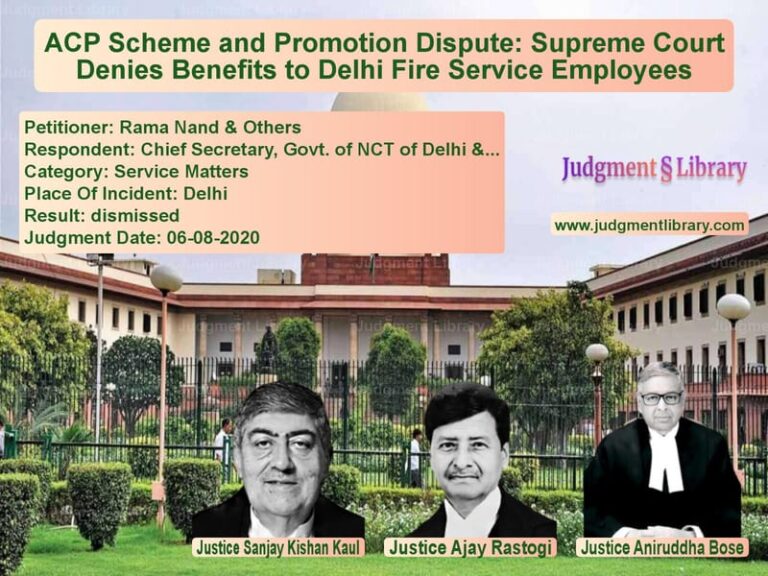Supreme Court Clarifies Arbitrator’s Power to Award Pendente Lite Interest Under Arbitration Act 1940
In a significant ruling that clarifies the interpretation of contractual clauses barring interest payments in arbitration cases, the Supreme Court of India delivered a landmark judgment in M/s Ferro Concrete Construction (India) Pvt. Ltd. vs. The State of Rajasthan on April 2, 2025. The bench comprising Justices Pamidighantam Sri Narasimha and Joymalya Bagchi settled an important question regarding an arbitrator’s power to award pendente lite interest under the Arbitration Act, 1940 when the contract contains clauses restricting interest payments.
Detailed Background of the Dispute
The case originated from a works contract awarded by the State of Rajasthan to M/s Ferro Concrete Construction (India) Pvt. Ltd. (hereinafter ‘the Contractor’) on February 6, 1988. The contract contained Clause 22 which specifically stated:
“The contractor shall not be entitled to claim any interest upon any payment, any arrears or upon any balance, which may be found due to him at any time.”
Disputes arose between the parties regarding payments, leading the Contractor to invoke arbitration. The arbitrator, in an award dated March 7, 1995, awarded:
- A principal sum of Rs. 1,78,17,146 in favor of the Contractor
- 15% interest per annum on all dues payable from December 18, 1991 (date of arbitrator’s reference) till payment or date of decree, whichever was earlier
The State of Rajasthan challenged the award before the District Judge, who in an order dated August 16, 2005:
- Upheld the principal amount awarded
- Set aside the 15% interest awarded by the arbitrator
- Instead granted simple interest at 9% from the date of award till payment
Both parties appealed to the Rajasthan High Court, which in its judgment dated January 6, 2023, dismissed both appeals and upheld the District Judge’s order. The Contractor then approached the Supreme Court, leading to the present appeal.
Detailed Arguments Before the Supreme Court
Appellant’s (Contractor) Submissions
Mr. Vinayak Mehrotra, learned counsel for the appellant Contractor, made the following detailed submissions:
“The present issue is squarely covered by this Court’s decision in Reliance Cellulose Products Ltd vs Oil and Natural Gas Corporation Limited (2018) 9 SCC 266. Clause 22 of our agreement does not specifically exclude either the power of the arbitrator to grant pendente lite interest or rule out the claimant from claiming interest pendente lite in the course of arbitration.”
He further elaborated:
- The contractual clause must expressly bar interest for disputes before arbitrators to constitute an ouster of the arbitrator’s jurisdiction
- Clause 22 only prohibits the contractor from claiming interest on payments/arrears, but doesn’t mention disputes or arbitration
- Relied on Pam Development’s Private Limited v. State of West Bengal (2024) 10 SCC 715 which distinguished between the 1940 Act and 1996 Act positions
- Under the 1940 Act, courts have taken a stricter view requiring express exclusion of arbitrator’s power
- Highlighted that the State had already paid Rs. 4.65 crores, including Rs. 2.83 crores as interest, showing their understanding of liability
Respondent’s (State) Counter-Arguments
Ms. Sansriti Pathak, learned Additional Advocate General for the State of Rajasthan, presented a detailed rebuttal:
“First, the interpretation of an ouster clause is the same under the 1940 Act and the Arbitration and Conciliation Act, 1996. Under both statutes, the arbitrator can award interest unless the agreement provides otherwise.”
Her submissions included:
- The clause “at any time” in Clause 22 is wide enough to cover all periods, including pendente lite
- Reliance Cellulose’s reliance on Engineers-De-Space-Age was questionable as it had been doubted in subsequent cases
- Cited Union of India v. Ambica Construction (2016) 6 SCC 36 (First Ambica case) where a 3-judge bench clarified that express stipulations barring interest must be respected
- Referred to M.B. Patel & Co. v. ONGC (2008) 8 SCC 251 and Union of India v. Krafters Engg. & Leasing (P) Ltd. (2011) 7 SCC 279 where narrower clauses were treated as ousters
- Highlighted that substantial payments (Rs. 4.65 crores) had already been made, with Rs. 2.83 crores being interest
Supreme Court’s Detailed Analysis
1. Legal Framework Under Arbitration Acts
The Court began by clarifying the different legal positions under the 1940 Act and 1996 Act:
“Under the Arbitration Act, 1940, there was no specific provision that empowered an arbitrator to grant interest. However, through judicial pronouncements, this Court has affirmed the power of the arbitrator to grant pre-reference, pendente lite, and post-award interest on the rationale that a person who has been deprived of the use of money to which he is legitimately entitled has a right to be compensated for the same.”
The Court contrasted this with Section 31(7) of the 1996 Act which expressly provides for interest awards but sanctifies party autonomy.
2. Evolution of Jurisprudence
The judgment contains a comprehensive review of precedent, including:
- G.C. Roy (1992): Recognized arbitrator’s power to grant interest unless expressly barred
- N.C. Budharaj (2001): Confirmed jurisdiction unless expressly excluded
- Engineers-De-Space-Age (1996): Held bar under contract may not apply to arbitrator
- First Ambica Construction (2016): 3-judge bench clarified that express bars must be respected
- Reliance Cellulose (2018): Distinguished between 1940 and 1996 Act positions
3. Interpretation of Clause 22
The Court analyzed the specific wording of Clause 22:
“We find that this clause does not expressly bar the award of pendente lite interest in the event of disputes, differences, or misunderstandings between the parties, or on delayed payment, or in any other respect whatsoever. Under the 1940 Act, this Court has not readily inferred a bar on the arbitrator from clauses that merely bar the contractor from claiming interest.”
4. Distinction Between 1940 and 1996 Acts
The Court elaborated on the different interpretative approaches:
“Under the 1940 Act, a stricter approach is followed that requires a clear and express clause against the payment of interest in case of difference, dispute, or misunderstanding, in case of delay of payment, or any other case whatsoever, to constitute a bar on the arbitrator from granting interest. A clause that only provides that interest shall not be granted on amounts payable under the contract would not be sufficient.”
Court’s Final Decision and Directions
After this exhaustive analysis, the Supreme Court:
- Allowed the appeal and set aside the High Court’s judgment
- Held that Clause 22 didn’t expressly bar pendente lite interest for disputes before arbitrators
- Modified the interest rate from 15% to 9% considering:
- Passage of time since 1991
- Substantial payments already made by State
- Current economic conditions
- Directed payment of 9% interest for pendente lite period (December 18, 1991 to March 7, 1995) within 60 days
- Made no order as to costs
Significance of the Judgment
This judgment makes several important contributions to arbitration law:
- Clarifies the different standards for interpreting interest bars under 1940 Act vs 1996 Act
- Reaffirms that under 1940 Act, contractual bars must specifically mention disputes/arbitration
- Harmonizes seemingly conflicting precedents on the issue
- Provides guidance on how courts should approach such contractual clauses
- Balances strict legal interpretation with equitable considerations through interest rate modification
The ruling will have significant implications for pending and future cases involving interpretation of similar contractual clauses, particularly in older contracts governed by the 1940 Act.
Petitioner Name: M/s Ferro Concrete Construction (India) Pvt. Ltd..Respondent Name: The State of Rajasthan.Judgment By: Justice Pamidighantam Sri Narasimha, Justice Joymalya Bagchi.Place Of Incident: Rajasthan.Judgment Date: 02-04-2025.
Don’t miss out on the full details! Download the complete judgment in PDF format below and gain valuable insights instantly!
Download Judgment: ms-ferro-concrete-c-vs-the-state-of-rajasth-supreme-court-of-india-judgment-dated-02-04-2025.pdf
Directly Download Judgment: Directly download this Judgment
See all petitions in Arbitration Awards
See all petitions in Commercial Arbitration
See all petitions in Contract Disputes
See all petitions in Enforcement of Awards
See all petitions in Settlement Agreements
See all petitions in Judgment by P.S. Narasimha
See all petitions in Judgment by Joymalya Bagchi
See all petitions in allowed
See all petitions in supreme court of India judgments April 2025
See all petitions in 2025 judgments
See all posts in Arbitration and Alternate Dispute Resolution Category
See all allowed petitions in Arbitration and Alternate Dispute Resolution Category
See all Dismissed petitions in Arbitration and Alternate Dispute Resolution Category
See all partially allowed petitions in Arbitration and Alternate Dispute Resolution Category







